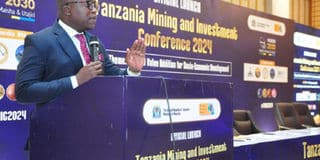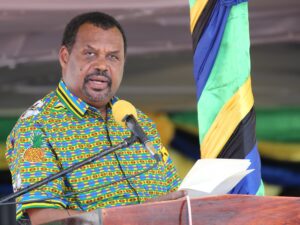Dar es Salaam. Tanzania is working out a plan to become Africa’s largest graphite producer.
Currently, the country stands in third place on the continent after Madagascar and Mozambique.
Tanzania contributes only 0.64 percent to Africa’s graphite production, while Madagascar and Mozambique account for 13 and 10 percent, respectively.
But the Minister for Minerals, Antony Mavunde, said in Dar es Salaam yesterday that if the ten companies that currently hold graphite mining licenses start production, Tanzania will surpass the two and become Africa’s leading mineral producer.
Graphite is used to make pencils, lubricants, crucibles, foundry facings, polishes, brushes for electric motors, and the cores of nuclear reactors.
Its high thermal and electrical conductivity makes it a key part of steelmaking, where it is used as electrodes in electric arc furnaces.
Statistics produced by Mr Mavunde when he announced the Tanzania Mining and Investment Conference yesterday show that the globe needs 6.5 million metric tonnes of graphite and that currently, China is leading with 64 percent globally.
Minister for Minerals Anthony Mavunde speaks at a preparatory meeting of the international conference on investment in the mining sector in Dar es Salaam yesterday. PHOTO | MICHAEL MATEMANGA
The three-day conference will start on November 19, 2024, in Dar es Salaam.
“Tanzania has not started utilising the minerals in full swing, but there are 10 licenses that are not operational, but when they become fully operational, Tanzania will rank among the largest producers,” Mr Mavunde said.
Meanwhile, explaining about the conference, he said Tanzania hosts vast mineral resources, which include metallic minerals (gold, iron, nickel, copper, rare earth elements, niobium, lithium, cobalt, lead, and platinum group metals), gemstones (tanzanite, ruby, sapphire, spinel, amethyst, rhodolite, and tsavorite), and industrial minerals (phosphates, limestones, gypsum, dolomite, graphite, iron ore, kaolin, bauxite, and many dimension stones such as granites and marbles).
Given this, he said mining contributes 56 percent of forex from exports and will not issue licenses for major mining activities unless investors show a comprehensive plan for value addition.
“The immense potential of Tanzania’s mining sector while promoting responsible and inclusive mining practices. The conference will provide a platform for participants to engage in meaningful discussions, share insights, and identify strategies for enhancing the sector’s contribution to the country’s economy and sustainable development,” he said.
He said the conference aims to promote Tanzania’s mining potential, which will highlight Tanzania’s rich mineral resources and provide an opportunity for local and international investors to discover the vast potential of mineral exploration projects, mineral beneficiation, and value addition from numerous mineral categories.
Further, he noted that it will enhance mineral value addition by promoting value addition, which is crucial for realising the full potential of the mining sector.
“Historically, Tanzania has been predominantly exporting raw minerals without significant processing, missing out on the opportunity to capture a larger share of the value chain. By encouraging local processing and beneficiation of minerals, the country can create a more sustainable and inclusive mining industry that benefits local communities and the economy as a whole,” he said.
He noted that they will foster public-private partnerships by facilitating dialogue and collaboration between government representatives and private sector stakeholders, encouraging mutually beneficial partnerships to support the growth and development of the mining industry.
Further, he noted sustainable mining practices by recognising the importance of environmental and social responsibility. The conference will focus on promoting sustainable mining practices, including environmentally friendly mining technologies, community engagement, and responsible resource management.
On investment opportunities, he said the conference will showcase investment opportunities in the mining sector, offering a platform for investors to connect with mining companies, explore potential projects, and facilitate investment deals.
For his part, deputy Permanent Secretary, Ministry of Mineral, Mr Msafiri Mbibo, said this is the fifth Tanzania Mining Investment Forum.
“The forum is expected to bring together many stakeholders from around the world, and the theme for the 2024 Tanzania Mining Investment Conference is mineral value addition for socio-economic development,” he said.















